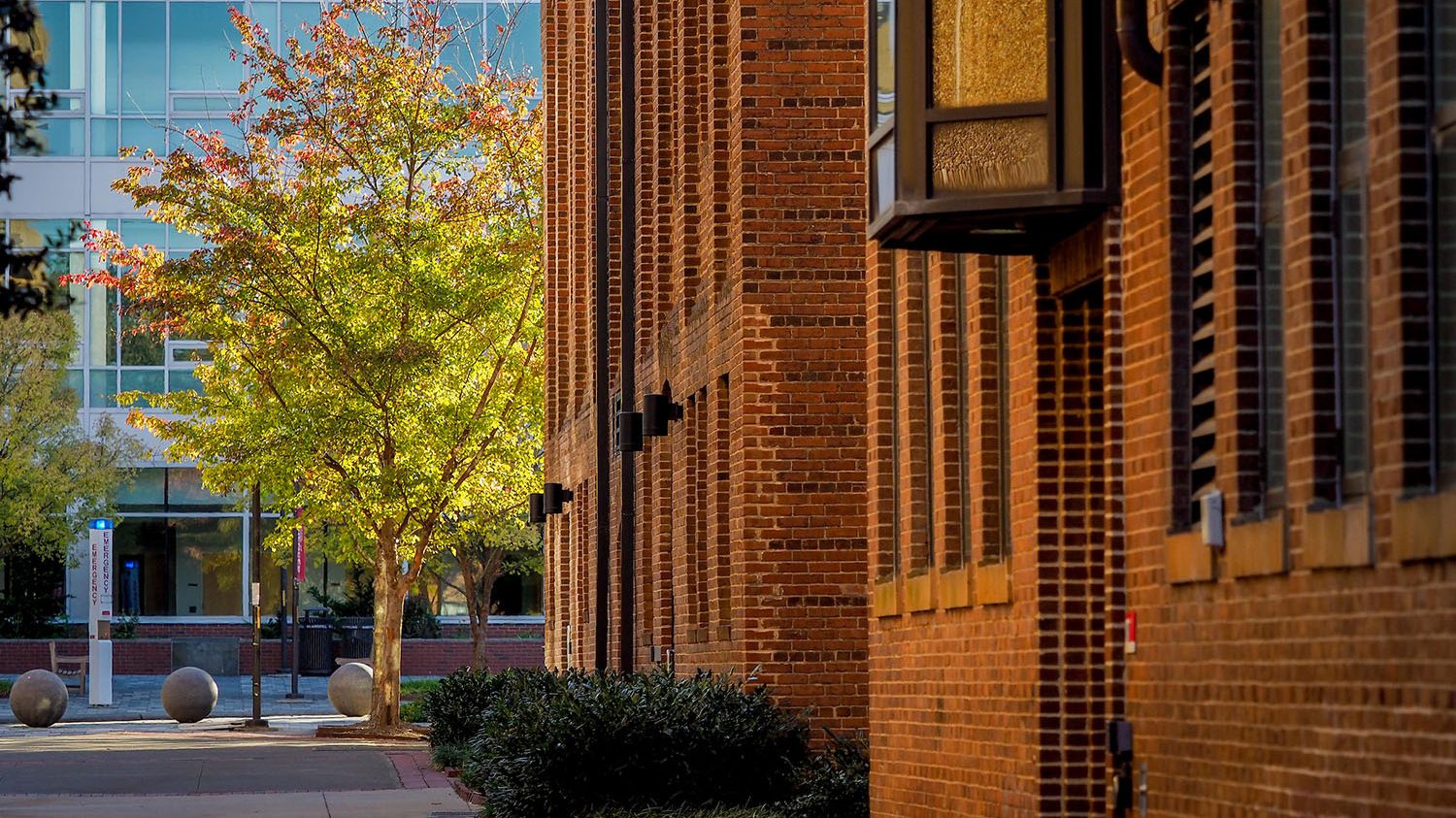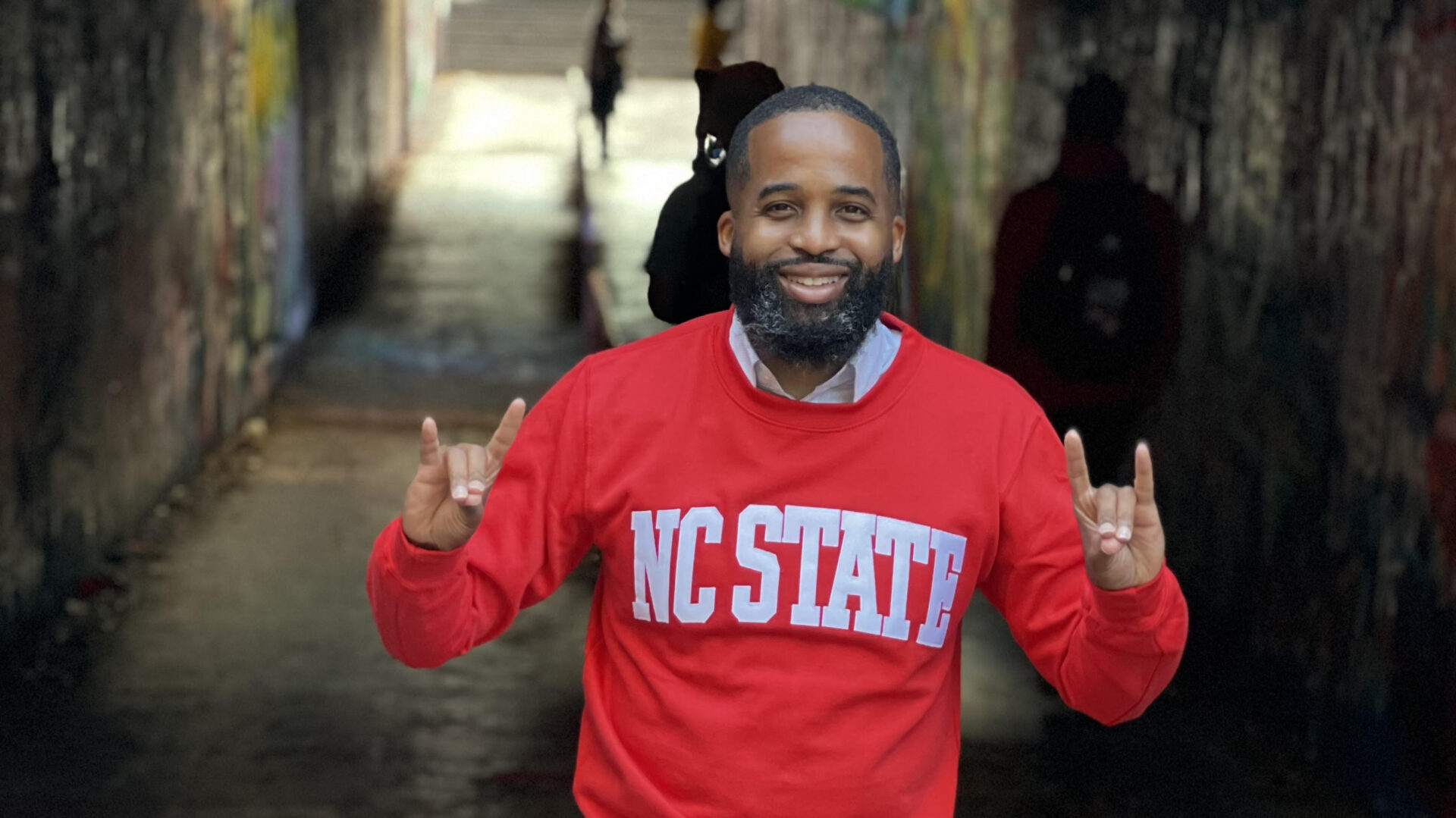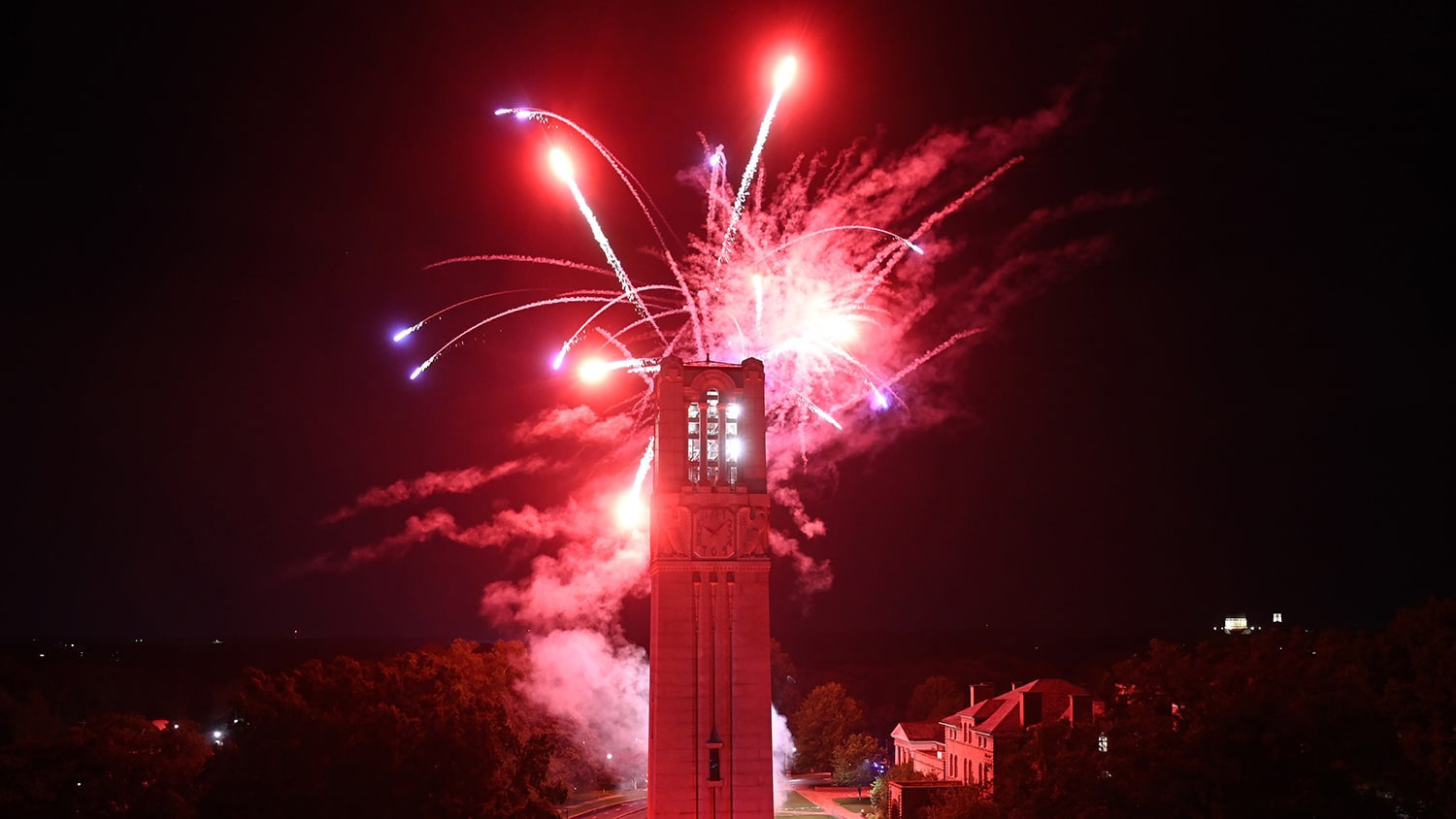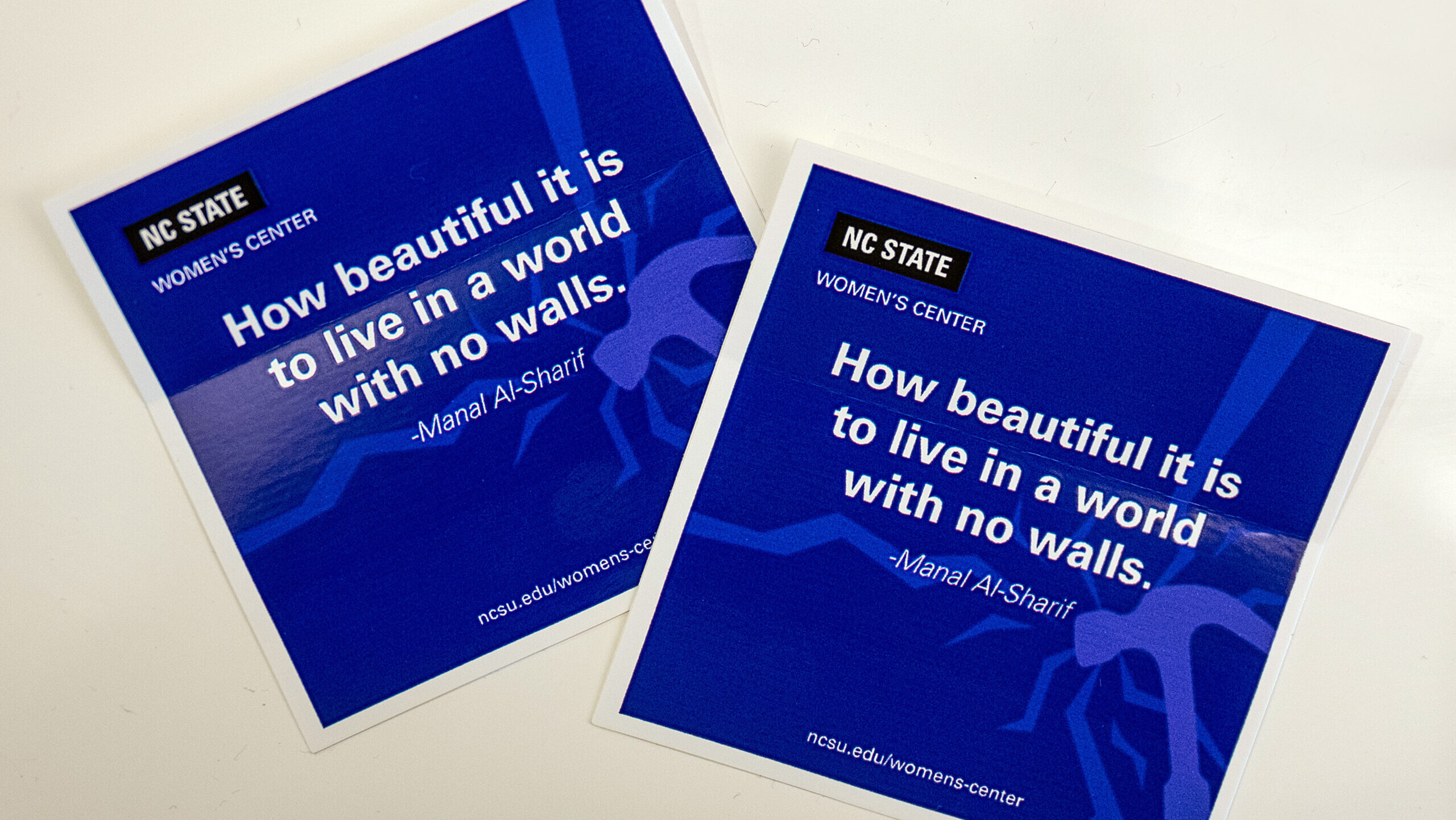One of our most urgent and ongoing fundraising priorities is ensuring every member of the Pack has the resources needed to stay on track and thrive during their time at NC State. Mike Giancola, student ombudsperson and assistant vice provost, plays a key role — with the support of his team, campus partners and NC State donors — in helping students succeed.
We recently spoke to Giancola about Pack Essentials services, student needs at NC State and how private support empowers our students.
What is Pack Essentials and how did it begin?
Mike Giancola: Pack Essentials is a resource started in 2017 in response to the growing needs of our students. At the same time, a study led by [NC State researcher and psychology professor] Mary Haskett showed the extent of food and housing insecurity on campus. A campuswide team of faculty, staff, students and administrators came together with the Division of Academic and Student Affairs to explore how we could better support students in need. This group became the Pack Essentials Steering Team.
The Pack Essentials website is a centralized portal with an application identifying services like the Student Emergency Fund, PACK Meal Share, Feed the Pack food pantry, PACK Housing Scholarships and Pack Meal Plan Scholarships, which can help a student experiencing food, housing or financial insecurity. When students submit the application, it comes to me as the student ombuds and activates the network on campus to get them the resources they need and offer access and support around basic needs.
What is meant by “basic needs”?
Giancola: We think of basic needs to be inclusive of food and housing, and increasingly, we are looking at things like making sure students have access to appropriate medical care. Mental health care has been really critical, especially during the COVID-19 pandemic, and it will continue to be.
How does the Pack Essentials application process work?
Giancola: We work in collaboration with the Office of Scholarships and Financial Aid to make sure each student has the appropriate eligibility, in compliance with federal requirements, and then I or one of my staff members call the student. Our goal is always to respond to the student within 24 hours. We make the call and have a comprehensive discussion with the student to get a better understanding of their situation, what their needs are, what resources on campus we can connect them to and which resources we may need to connect them to in the greater community.
Quite simply, we understand students may struggle with chemistry or Spanish. We never want them to struggle with where their next meal is coming from, being able to pay their rent or having a safe place to stay.
What are NC State students facing now that they might not have faced five, 10 or 20 years ago?
Giancola: The initial study by Mary Haskett and her team revealed 14.5% of students experienced some form of food insecurity and about 10% of students had housing insecurity. When you think about that distributed over the 34,000-plus students at that time, it’s not an insignificant number.
I always say one student is too many; thousands is unacceptable — because that is really the approach I think we need.
Make an Immediate Impact
When we repeated the study in November 2020 — six months after the pandemic started — those numbers spiked to 23% for food insecurity and 15% for housing insecurity. So effectively, just under one in four students had some amount of food insecurity within a 30-day period.
Now, it’s not to say students did not have food insecurity 10-15 years ago, but I think we have a better understanding now of what that looks like.
And I want to be clear — it’s important to understand this is not a problem created by the pandemic. It’s not a problem created by inflation for food or gas. It’s one that is exacerbated by the pandemic and absolutely made worse by inflation, but keep in mind the first study took place in 2017.
So this is an existing problem, and it’s also not unique to NC State. We are seeing these issues all over the country at universities, partly because of the rising cost of higher education and living costs as well as stagnant forms of aid like Pell grants.
The good news is that we have expanded access. We have not lowered our standards, but we have attracted more students from different demographics, who maybe would not have come to NC State previously. We have more students from families with less generational wealth or income, and that’s good. We want to make sure we’re setting students up to succeed.
Going forward, what do you think the most urgent needs for students might be?
Giancola: Food and housing continue to be critical. In the last week, I had students call me and say, “I cannot find a place to stay in the fall. I may not be able to come to NC State because I do not have a place to stay.”
We created the housing scholarship a year ago as a way to try to help support students. We can provide rent assistance to allow them to get on a firm footing and establish a network.
But rents off campus have gone up 20% in the last year, and with all the companies coming to town, the desire for those spaces increases. And you might not think there will be competition for student spaces, but a lot of nearby student housing is luxury, so it’s not unheard of that someone moving here would want to live in those apartments on Hillsborough Street or in the Village District. Housing is absolutely going to be critical.
The other area we have really honed in on is making sure students have access to mental health care. We are working with the Counseling Center — students can use the Counseling Center on campus through their student health fees. But increasingly we have students who have severe conditions the Counseling Center cannot support on an ongoing basis, so we have used funds to be able to help support students to get mental health care in the community to help with continuity of care.
The Student Emergency Fund gives us the flexibility to deal with whatever issue the student is facing, whether it’s a hurricane or gas prices. The fund is an all-purpose tool that allows us to respond to whatever the need is that is distracting the student from being at their best.
How have our donors stepped up to support students in meeting their basic needs?
Giancola: This is a good news story! Because Pack Essentials and the Student Emergency Fund have been around for several years, we had support and a base of donors even before the pandemic. When the pandemic started, we were getting 30 to 40 applications a day, which quickly climbed to nearly 120 applications a day. So the support we already had allowed us to focus on meeting students’ needs, rather than focusing on whether we had enough money.
I cannot say enough about the way in which the NC State alumni, faculty, staff and friends responded. My job as the ombudsperson has gotten immensely more difficult since the pandemic, but by and large, I have had the resources to help students. Donors have been vital.
The thing about their support is it’s going straight to the students in terms of grants. And I think donors appreciate the way we have designed the model and all the partners we have lined up. If students submit an application in the morning, we are usually getting back to them by the afternoon. If we make a grant, financial aid [staff] will process it at the end of each day, so the only delay is the bank transfer.
The response is very quick, and students feel that. As much as the dollars are important, knowing somebody cares about them is something you cannot put a price on. Students share with us just how much they appreciated the university responding and we cannot do that without the donor support. So I think our community should be really proud.
But there will be more students who need help this semester, and next semester, so the need continues, and that is the message we want to share to alumni and donors: We need to continue to provide support.
When students ask who to thank, we say the way to thank the donors is to go to class and do well or finish your dissertation. And then if they are in a position at some point to give back to the program, they can be the next generation of alumni who support the students who come in five years from now. So we are creating a culture of giving that says the Wolfpack helps the Wolfpack when there is a need.
And I think that is the other benefit of how we run Pack Essentials — we are making sure students understand there is an opportunity for them to give back once they have graduated.
Are there any misconceptions about our students’ needs you want to clarify for our university community?
Giancola: That is a great question. Some people who we have encountered wonder why students do not just get a job or just work over the summer, because for some of our alumni and donors, that was their experience. Doing the math, it does not work that way anymore. You cannot work enough hours in the summer, unless you are in a really high-paid, lucrative job, to cover the cost of tuition, housing and food.
I also want folks to recognize most of the students who reach out through Pack Essentials are doing fairly well academically. And when they are not, it’s often because they are dealing with so much financial stress they are worried about whether they can pay their rent. They are not worried about studying for their test. But for the most part, students are making good progress.
And then the other piece of that is most of these students are working two and three jobs. They are working part-time and many of those jobs are low-paying, and there are only so many hours. And then they have one emergency where the car breaks down or they have an emergency room visit, and they are trying to prioritize paying rent, paying tuition, buying food or paying a medical bill.
So I think it’s just recognizing the students who we are supporting are working hard in the classroom and many of them have jobs outside, but they just cannot make ends meet month-to-month, let alone if some unexpected emergency happens. And if you are a student who is struggling to make ends meet, it can be pretty isolating.
With so many worthy causes to support right now, many donors are looking to make an impact quickly. How can they make an immediate difference at NC State?
Giancola: The Student Emergency Fund gives us the most flexibility. It’s the most all-purpose tool we have, allowing us to provide meal support, rent support, support for mental health or medical expenses all through one fund. But if someone is really passionate about making sure students have access to food, then a gift to the Pack Meal Plan Scholarship or Feed the Pack makes a quick impact, or the same with helping with housing insecurity and giving to the PACK Housing Scholarship. All of these resources directly support students and their needs.
There are a lot of opportunities out there and a lot of things people can give money toward, so I want to reinforce our commitment to being rapid in our response. That is really where our focus is — to make sure the students know we care and we can get back to them quickly. Your gift is not just sitting in an account. We are moving quickly every day to talk with students, find out what their needs are and put together a plan for the emergency — and get them to graduation.
And so, when you think about investing in the Student Emergency Fund, or any of these funds, that’s an investment in students’ education. At the same time you are investing in their health and wellbeing because you are making sure they have a safe place to stay, food and the medical care they need.
How does Pack Essentials tie in to resources like the Extraordinary Opportunity Scholarship Initiative, which provides need-based scholarship support?
Giancola: Students will always have emergencies, but the more we can provide upstream support in terms of scholarships and financial aid, the less likely they will be to need Pack Essentials. These funds all work together in terms of being more proactive while addressing emergencies when they come up.
What’s the most rewarding part of your work?
Giancola: It’s having a Wolfpack community that cares about our students and what we are doing. When I thank donors, I try to write a handwritten thank-you note, and one of the things that I say is their generosity helps put action behind our words. Because our words are, “Come join the Wolfpack community. We are going to do everything we can to help you be successful.” And we mean that, but if we do not have the resources to put to bear, then those are just words.
The Wolfpack community has been very supportive. We can say we want you to be successful and we care about you and here’s how we’re going to help.
And I don’t take it for granted — not every school is in that situation. Chancellor [Randy] Woodson talks openly about what our students face. His leadership is critical. He is willing to acknowledge this is a challenge, and we are working to solve it.
So the most rewarding part is being able to live out what we are saying to students in the recruitment process. We do not want students to struggle, but when they do, we have the resources to help them.
- Categories:



